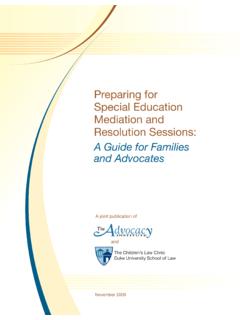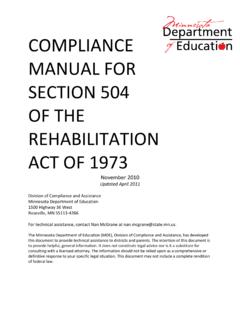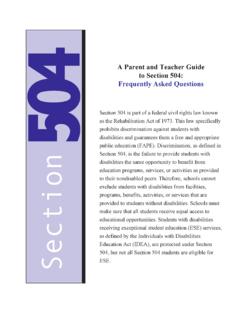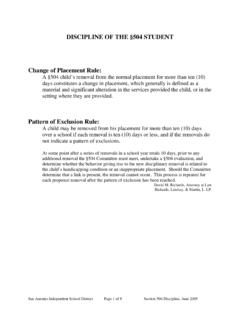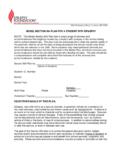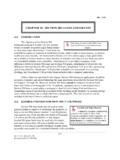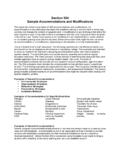Transcription of BLIGATIONS OF CHOOL OF THE EHABILITATION ACT OF …
1 Page 1 of 22 OBLIGATIONS OF SCHOOL DISTRICTS UNDER section 504 OF THE REHABILITATION ACT OF 1973 WITH UPDATES ON THE ADA AMENDMENTS ACT RONALD M. HAGER NATIONAL DISABILITY RIGHTS NETWORK JULY 2011 A. Introduction section 504 was included in the Rehabilitation Act of 1973. The major thrust of the Rehabilitation Act of 1973 was to provide federal funding and a mandate for vocational rehabilitation services for people with disabilities. section 504,1 however, which prohibits discrimination on the basis of disability,2 was modeled after the Civil Rights Act of 1964. section 504 also served as the foundation for the Americans with Disabilities Act (ADA).3 section 504 is a very broad statute. It prohibits discrimination in any program or activity receiving federal financial assistance.
2 It also applies to any programs run by the government. The relevant part of the law is: No otherwise qualified individual with a disability in the United States, as defined in section 706(8) of this title, shall, solely by reason of her or his disability, be excluded from the participation in, be denied the benefits of, or be subjected to discrimination under any program or activity receiving Federal financial assistance or under any program or activity conducted by [the government].4 129 794; 34 Part 104. 2 See Peoria (AZ) Unified School District, 50 IDELR 113 (OCR 10/16/07) (School district discriminated on the basis of disability when it relocated the special education students to another school to make room for a larger number of regular education students but did not relocate any regular education students).
3 342 12101 et seq. 429 794(a). Page 2 of 22 The ADA basically extends the provisions of section 504 to other entities that do not receive federal funds. The ADA has five titles, two of which specifically apply to the rights of children with disabilities who are in school. Title II prohibits discrimination on the basis of disability by state and local governmental services, which includes public Title III prohibits discrimination on the basis of disability by places of public Private schools are specifically covered by Title But, private schools run by religious organizations are The Department of Education s Office for Civil Rights (OCR) enforces both section 504 and the ADA. OCR will apply the section 504 standard to ADA complaints as well.
4 This is because the ADA is not intended to apply a lesser standard than section Accordingly, OCR interprets the Title II regulation to require school districts to provide a FAPE to the same extent required under the section 504 B. Covered Entities Since, virtually all, if not all public school districts receive federal funds, they are covered by section 504. However, there is no separate funding available under section 504 to assist schools in meeting their responsibilities under section 504. By receiving federal money for other programs, such as IDEA, they are required to comply with section 504. Additionally, any private schools which receive federal funds, including those run by religious organizations, are also covered, even if they receive the money Many private schools may receive federal funds from the local school district in which they are located in the form of textbook aid, or aid for school breakfast or lunch and, therefore, are covered by section 504.
5 However, private schools are only obligated to provide reasonable section 504 also applies to a public online high school operated statewide by a public 542 12131-12165. 6Id. 12181-12189. 7Id. 12181(7)(J). 8Id. 12187. 9 Policy Letter to Zirkel, 20 IDELR 134 (OCR 8/23/93). 10 Saddleback Valley (CA) Unified Sch. Dist., 27 IDELR 376 (OCR 5/5/97). 1134 (f). 1234 Page 3 of 22 school district via contract with a private The online school was owned and operated by a private entity under a management services agreement with the school district. Even though the agreement said the private company was responsible for complying with all applicable laws, the school district violated section 504 by not ensuring that the online school operated in compliance with section 504.
6 The program discriminated in admissions decisions. First, it refused to admit students needing certain accommodations or services, including modified curriculum, behavioral goals requiring counseling or therapy, translator support, para-educator support, more than 40 minutes per week of special education instruction, certain AT, extended time to complete course, or tutoring. Second, it refused to admit students who could not complete work independently or who had a reading/writing ability below 6th/7th grade. Finally, a school district may not provide significant assistance to an outside entity that discriminates against persons with disabilities even if that outside entity is not covered by section 504 or the ADA. Significant assistance need not be in the form of financial assistance.
7 OCR found that a school district violated section 504 by providing significant assistance to a YMCA that operated before and after school programs at many of the districts schools. The assistance took the form of reduced rent, assistance in distributing information about the program, and promoting it to The YMCA discriminated against students with disabilities by categorically refusing to provide one-on-one aides, diapering services or the administration of insulin instead of individually determining whether an accommodation request would fundamentally alter the program or constitute an undue C. Eligibility To be eligible for services under the IDEA, a student's disability must meet the definition of one of several listed disabilities and, as a result, the student must require special education services.
8 The definition of disability under section 504 is much broader. The statute defines an "individual with a disability" as: [A]ny person who (i) has a physical or mental impairment which substantially limits one or more of such person's major life activities, (ii) has a record of such an impairment, or (iii) is regarded as having such an 13 Quillayute Valley (WA) School District, 49 IDELR 293 (OCR 11/26/07); see also Elkhart (KS) Unified School District 218, 51 IDELR 51 (OCR 3/26/08) (Online school operated by school district and available to students across the country required to inform students of the procedures to request accommodations and should be able to provide, at a minimum, modifications to the regular education program including test taking and assignment deadlines).
9 14 Capistrano (CA) Unified School District, 108 LRP 17704 (OCR 10/10/07). 15Id. 1629 706(8)(b). Page 4 of 22 Additionally, under section 504, students with disabilities are eligible even if they do not need any special education services. A student would be eligible if the only services received were modifications in the regular education Therefore, students whose disabilities do not meet the criteria for special education, but who still need some specialized assistance, including assistive technology, may be covered by section Furthermore, if a school determines that a student with a disability is not eligible for services under the IDEA, it must have a process in place to determine whether the student is covered by section The district is required to do an evaluation of any person who because of disability needs, or the district believes to need, regular or special education and related services.
10 If the district does not believe the student has a disability and refuses to evaluate the child it must give the parents notice of their due process 1. Other Health Impaired example The eligibility criteria for both the IDEA and section 504 can be better understood by looking at an example under the category of other health impaired (OHI). Under the IDEA, OHI is defined as: Other health impairment means having limited strength, vitality, or alertness, including a heightened alertness to environmental stimuli, that results in limited alertness with respect to the educational environment, that (i) Is due to chronic or acute health problems such as asthma, attention deficit disorder or attention deficit hyperactivity disorder, diabetes, epilepsy, a heart condition, hemophilia, lead poisoning, leukemia, nephritis, rheumatic fever, sickle cell anemia, and Tourette syndrome; and (ii) Adversely affects a child's educational Applying this definition to a student with Rheumatoid Arthritis, the mere fact that Rheumatoid Arthritis is not explicitly mentioned in the definition does not preclude coverage.
